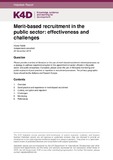Merit-based Recruitment in the Public Sector: Effectiveness and Challenges
Abstract
In recent years, countries in the Western Balkans have taken various measures, such as reforming and adopting legislation, to increase the scope of merit-based recruitment procedures (Meyer-Sahling et al., 2019). There is still significant public perception, however, that political connections and nepotism often play important roles in getting jobs in the public sector in the region (Stojanović-Gajić, 2018). The implementation of current recruitment systems is subject to gaps and pockets of non-compliance, particularly in the case of recruitment into senior positions (Sigma, 2018a; Schuster, 2017; Meyer-Sahling et al., 2015). Merit-based recruitment processes comprise three phases: (1.) application; (2.) assessment and selection; and (3.) final appointment. Recent research finds that public vacancy announcements are generally effective in increasing the transparency of recruitment processes and broadening the pool of potential applicants (Meyer-Sahling et al., 2018). E-recruitment mechanisms and social media tools have professionalised the application process in the Western Balkans and have the potential to continue to strengthen merit recruitment (Meyer-Sahling et al., 2019). The dense regulation of job advertisement procedures removes discretion over the contents of advertisements (Meyer-Sahling et al., 2015). Merit-based selection mechanisms include competency frameworks with well-defined assessment criteria that can be used to evaluate candidates in relation to job demands. Such frameworks are still largely absent in the Western Balkans or not yet applied, with the exception of Bosnia and Herzegovina (BiH) (Sigma, 2018a). Some of the literature identifies the final appointment of candidates as the one phase in which politicians may play a role and where limited political discretion allowed (Sigma, 2018a). This may be through the final selection of a candidate from a pre-filtered list. If political discretion is too wide, however, this can undermine confidence in selection procedures (Sigma, 2018a).
Citation
Haider, H. (2019). Merit-based recruitment in the civil service: effectiveness and challenges. K4D Helpdesk Report. Brighton, UK: Institute of Development Studies.Is part of series
K4D Helpdesk Report;695Rights holder
© DFID - Crown copyright 2019Collections
- K4D [937]

